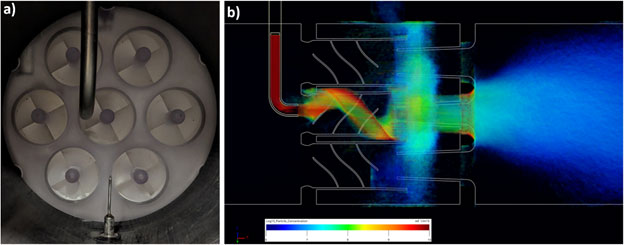Techsburg and Virginia Tech selected for a U. S. Navy Phase I STTR contract entitled “Improved Particle Tracking Through Efficient Scale-Resolving Simulations and Advanced Physics Models”

ABSTRACT: It is well known that gas-turbine powered aircraft operating in brown-out conditions can ingest a significant amount of particles leading to reduced engine performance, a reduction in time between maintenance and increased safety concerns. As such, it is critical to be able to accurately model the impact of ingested particles in engines for both maintenance purposes and in the design of new, more robust components. The current state-of-the-art for modeling particle in gas turbines couples steady-state Reynolds Averaged Navier Stokes (RANS) CFD with Lagrangian particle tracking. Additional submodels are used to capture turbulent dispersion and the physics of the surface interactions including bounce, adhesion, erosion, and shattering. Despite the significant advancements that have been made, continued model improvement is required. A commonly noted shortcoming of most current practices is the dependence on steady-state RANS CFD. Recent research has shown that Scale-Resolving-Simulations (SRS) (such as LES and DES) can address these shortcomings by time-accurately resolving the trajectory of solid particles through unsteady turbulent structures. Unfortunately, this capability comes with a significant computational cost making it impractical for use in the design stage.
There are two distinct solutions to these problems: improved turbulent dispersion models that more accurately account for unsteadiness in RANS simulations and more computationally efficient SRS formulations. The team of Techsburg, Inc. and Virginia Tech propose to explore both options in the Phase I effort. For the latter case, the team is proposing the application of the scale-resolving lattice-Boltzmann method solver PowerFLOW as an alternative to both RANS and Navier-Stokes-based LES solvers. As an SRS solver, PowerFLOW overcomes the limitations of steady-state RANS but does so with a fraction of the computation expense of Navier-Stokes-based LES. Maros et al (2020) demonstrated that PowerFLOW is approximately 50 times more computationally efficient than traditional Navier-Stokes LES for a typical turbomachinery simulation.
In order to improve upon the current state of RANS-based particle tracking, Techsburg and Virginia Tech propose to lay the groundwork for a series of experiments to acquire essential data to develop improved dispersion models. Unique to these experiments will be the ability to account for particle rotation and the resulting Magnus forces that influence that path of the particles, forces that have previously been unaccounted for.
